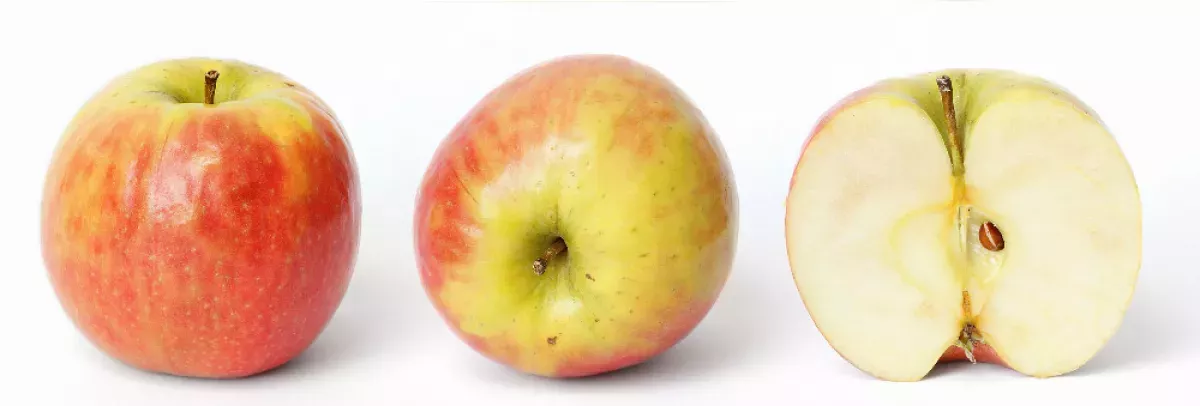An apple is a widely cultivated, round, edible fruit originating from Central Asia. The domestic apple tree, part of the *Malus* genus, has been grown for millennia in Eurasia and later introduced to North America by European colonists. Apples hold cultural and mythological significance in various societies and religions.
1922: Phrase 'An apple a day keeps the doctor away' First Recorded
In 1922, the phrasing "an apple a day keeps the doctor away", which is now commonly used, was first recorded.
1991: 'Honeycrisp' Released by the University of Minnesota
In 1991, the 'Honeycrisp' apple was released by the University of Minnesota. It became famous for its crispness and juiciness.
1994: Washington State University Apple Breeding Program Started
In 1994, Washington State University started a program to support their home state's apple industry.
2008: 'SweeTango' Introduced by the University of Minnesota
In 2008, the 'SweeTango', a cross between the 'Honeycrisp' and the 'Zestar' apples, was introduced by the University of Minnesota.
2010: Apple Genome Sequenced
In 2010, the apple fruit's genome was sequenced. This was part of research aimed at improving disease control and selective breeding practices in apple production.
2010: First Apple Whole Genome Sequence Completed
In 2010, the first whole genome sequence of an apple was completed based on the diploid cultivar 'Golden Delicious'.
2014: Proposal to Conserve M. domestica Voted Down
In 2014, the Committee for Vascular Plants of the IAPT voted down an earlier proposal to make Malus domestica a conserved name.
2015: FDA Determines Arctic Apples are Safe
In 2015, the US Food and Drug Administration determined that Arctic apples are as safe and nutritious as conventional apples.
April 2017: Committee Decides to Conserve M. domestica
In April 2017, the Committee decided, with a narrow majority, that the newly popular name Malus domestica should be conserved.
June 2017: General Committee Approves Conserving M. domestica
In June 2017, the General Committee of the IAPT decided to approve the change, officially conserving M. domestica.
2017: 'Cosmic Crisp' Released by Washington State University
In 2017, the 'Cosmic Crisp', a cross between the 'Honeycrisp' and the 'Enterprise' apples, was released by Washington State University.
2017: Canadian Food Inspection Agency Determines Arctic Apples are Safe
In 2017, the Canadian Food Inspection Agency determined that Arctic apples are as safe and nutritious as conventional apples.
2019: Arctic Apples Introduced to the US Market
In 2019, Arctic apples, a non-browning group of apples, were introduced to the United States market.
2023: World Apple Production
In 2023, the world production of apples was 97 million tonnes, with China producing 51% of the total.
Mentioned in this timeline
China officially the People's Republic of China is an East...
Minnesota is a U S state in the Upper Midwest...
The University of Minnesota Twin Cities located in Minneapolis and...
Trending

1 hour ago Maya Hawke and Christian Lee Hutson celebrated wedding with Stranger Things cast present.
1 hour ago Wizz Air Launches New Larnaka-Barcelona Flights, Boosting Tourism for Cyprus and Spain.

1 hour ago Jon Ossoff criticizes Trump, speech goes viral, fueling 2028 'Front Runner' speculation.
3 hours ago ANTM's controversies are revealed in a new Netflix documentary, with Tyra Banks facing criticism.
3 hours ago EU monitors Albania's legal changes: Concerns raised over Rama's SPAK amendment.
4 hours ago Arkansas State Police sees 29% drop in high-speed pursuits due to law changes.
Popular

Jesse Jackson is an American civil rights activist politician and...
Randall Adam Fine is an American politician a Republican who...

Pam Bondi is an American attorney lobbyist and politician currently...

Barack Obama the th U S President - was the...

Martin Luther King Jr was a pivotal leader in the...

Ken Paxton is an American politician and lawyer serving as...
